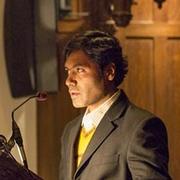
In 1990, Parameshwaran Ramakrishnan had no idea that he would one day be a divinity school student, let alone that he would find his calling bridging the worlds of spirituality and psychiatry as a multifaith hospital chaplain.
Back then, Ramakrishnan, now a first-year master of divinity degree candidate at HDS, was studying for his medical school entrance exam in India and fasting during the holy month of Ramadan, along with one of his Muslim friends.
Yet, halfway across the world and several years after he graduated from medical school, Ramakrishnan, found himself ministering to patients at St. Joseph Medical Center in Tacoma, Washington.
“I started working on how to take myself to a spot where spirituality and psychiatry could meet,” Ramakrishnan said. “The perfect meeting happened in chaplaincy.”
Born into an orthodox Tamil Brahmin family in Hyderabad, India, the journey from medical student at Goa Medical College to hospital chaplain in the United States spanned nearly two decades, and mirrors the simultaneous transformation of Ramakrishnan's religious identity from orthodox Hindu to multifaith believer.
In the intervening period, he studied psychiatry and neuroscience and served as a psychiatrist at various medical institutes in India. The deeper he went into his practice of medicine and psychiatric care, the stronger he felt pulled toward spirituality. Tugged in two directions, he sought a connection between the two.
Medical benefits of spiritual care
Not only did chaplaincy provide a bridge between psychiatric care and spirituality, it also deepened Ramakrishnan's conviction in his multifaith belief system and made him curious about the science and theology of empathy.
“When I was a chaplain, I started to learn how to empathize with the patients,” Ramakrishnan said. But he is quick to note that there is a huge difference between feeling empathy as a doctor and as a chaplain.
“Chaplaincy teaches the special art of feeling the pain of a patient,” he explained, adding that chaplaincy has also taught him how to empathize with people of varied faith backgrounds.
Ramakrishnan is encouraged by some recent studies showing that providing spiritual care to patients is linked to better clinical outcomes.
“What is happening in that sacred silence when chaplains sit next to their patients, holding their hands, praying, or listening with empathy? What is there in that empathy that is bringing up a better outcome?” he asked. “There's something happening and it is up to us to understand what that is.”
Research in the interdisciplinary domain of science and spirituality—”evidence-based theology,” as he refers to it—is sure to improve not just care provided to patients in hospitals, but also pastoral care in congregations.
Closing the science/spirituality gap
These are the questions and research interests that sparked Ramakrishnan's interest in divinity school. Even though he applied to several schools, he sensed that he might not be able to receive theological training in most institutions because of his multifaith belief system.
“If I say that I am a multifaith believer, they will not accept me,” he said. For him, HDS stood out, not only for its strong emphasis on pluralism, but also because of its interdisciplinary approach to the study of religion.
“I thought HDS would be a place where I could connect both my interests in psychiatry and spirituality,” he added.
Is it possible to integrate spirituality with psychiatry, and if so, how? Ramakrishnan hopes to find out at HDS.
He is taking courses across different faith traditions so that he can identify where religious differences stand out drastically, where the boundaries are mixed together, and where they are blurred. He is also a resident at the Center for the Study of World Religions.
He cites a methodology—intuitive thinking—introduced in HDS professor Charles Hallisey's Buddhist scriptural interpretation course, as helping bridge his two worlds.
After receiving a master of divinity degree from HDS, Ramakrishnan plans to complete a supervisory chaplain residence program. He believes that his training at the Divinity School will give him the necessary credentials to carve out the career he dreams of at the juncture of medicine and spirituality—spiritual psychiatry.
“I will try to find ways to create a space for that interface of science and spirituality.”
—by Jahnabi Barooah
